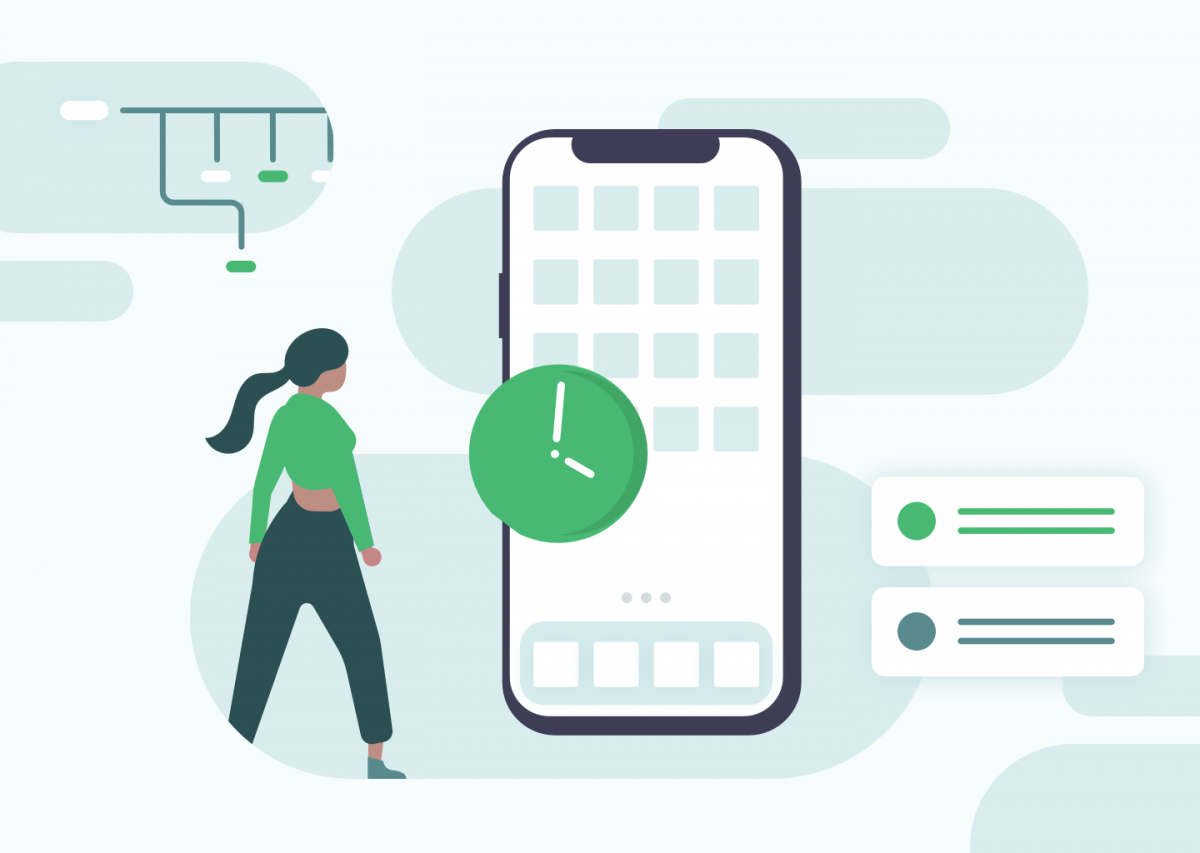It typically takes between 4-9 months for the initial build of a mobile app. Exactly how long will depend on the app’s complexity, scope and a few other factors. Creating a mobile app is a creative process and every single one is unique.
Here we’ll take a deep dive into what affects the timescale of your project and budget, the questions you should be asking and the answers to look out for.
- Top takeaways (TL;DR)
- How long does each stage of the app development process take?
- What happens after an app launches?
- What affects how long an app takes to make?
How long does an app take to make? – Top takeaways, if you only have two mins
- Initial launch – The first release of an app typically takes between four and nine months to develop
- Complexity is key – More complex apps with multiple features and two-way integrations will take longer to build than simple content apps
- Quality – High quality, polished apps take time. There’s a big difference between finished and finesse, to get that next level experience requires additional time to fine-tune the journey.
- Budget – Your budget and timescale are intrinsically linked. The cost to develop your app is based on the number of days it takes to build it. You need to make sure you have a realistic budget and share it early on with your developers so you don’t get any nasty surprises.
- Do your research – Selecting the right team, with the right mix of skills and experience will get the job done quicker. A battle-tested team will have a slick process as well as the familiarity of working together.
- Frequent releases – Release early and often. It’s best to release a solid v1 app with a reduced, but focused functionality set, and get early user feedback before developing more functionality. You’ll be surprised by the things your users tell you.
- Approval processes – You’ll need to think about these too, having well defined internal approval roles and processes within your team will reduce scope creep, timescales and budget increases.
What are the key stages in the app development process and how long will they take?
Four to nine months is a long time. You should ask your development studio about their process, what happens at each stage and how much time they take. Most processes are linear but often they’ll overlap so it is important to understand each one and why they are important to launching a successful app.
The six key stages are:
- Briefing – 1-2 weeks
- Discovery & prototyping – 2 – 6 weeks
- Design – 4- 6 weeks
- Development and testing – 10 – 16 weeks
- Deployment 1-2 weeks
1. Briefing – How to write a good app brief
This is another article in itself, but a good brief will help your chosen partner understand the problem you’re trying to solve and help them create the best possible solution. Spending the time upfront and finalising your brief internally will help you get to the answer quicker. And ultimately save you time and money in the long run. Writing a good brief will probably take you one to two weeks to draft and seek internal approvals.
The best briefs include:
- What’s the problem, really! What do your users/team find challenging, what is the impact on the organisation currently, what do you hope the app will help with and why?
- Users: Who is going to use your app? How are they going to find it and access it? It’s good to consider devices too, your staff might only use android devices or do most of your customers use iPad’s.
- Specific requirements: What are the things it needs to include or do. This could be content, functionality or a bit of both. If you have a long list it is helpful to prioritise them from most important to the least.
- Success metrics: What do you hope to achieve with the app? And when would you like to see these results? These metrics could be; engagement-based, reduce the effort required to complete a task, increase income or reduce timings. Just make sure they are SMART.
- Technical considerations: Do you need data to be passed between the app and another system? This could be a CRM or a database. It’s helpful to include the name of the system and information that you’d want to pass too.
- Budget: This doesn’t have to be a final figure but a range of how much you have to spend and whether it needs to include VAT is helpful too. If you need help understanding how much you might need, you can read our article – how much does it cost to create an app?
- Important dates: Does it need to be ready for an event, special day or time period?
2. Discovery & Prototyping
The discovery phase can take between two and six weeks, depending on the brief and scale. Discovery is the most important phase of an app build, it’s a truly collaborative process where together you and your product studio explore user requirements, feasibility, technical considerations, priorities and risks.
A prototype is the key output of this phase; as an interactive scaffold of your app, they are the perfect way to experience the workflows and carry out early user testing, without building a fully designed app. You quickly learn what works and what doesn’t, ensuring that you spend your time and money developing the best possible app.
Sign up to get helpful articles, case studies and the latest news straight to your inbox.
3. Design
The design phase takes between four to six weeks. And is where your app comes to life, visually. Working from the latest prototypes, the studio will develop:
- User interface (UI) & the user experience (UX)
- Visuals aligned to your brand/product
- Design rules that will guide the developers to build the app
4. Development and testing
The development of an app will take between 10-16 weeks, including testing. This is the phase where your app really comes to life. The time taken will depend on how you build your mobile app, native (iOS app/android app) or hybrid. the development time is the biggest part of the process, as all the functionality, integrations and content are developed.
Throughout the development stage, you’ll need to be testing on real mobile devices to ensure a smooth user experience. We run the Open Device Lab in Southampton with over 20 iOS and Android phones and tablets to test on. This is the best way to check for a consistent user experience and allows you to test more accurately. Picking up bugs and improvements early on in the development phase ensures a smoother deployment and launch for your users.
5. Deployment
Getting your app live on the app stores can take up to two weeks, depending on how long it takes for Google and Apple to review your app. There are four key phases to getting your mobile app live:
- Creating an app store account – To submit to the app stores you’ll need to set up a developer account, with your company information and contact details. Although this sounds pretty straightforward, this can take some time so it’s worth setting it up early in the project if you don’t have one already. Think about who will manage the app day-to-day, as they’ll need to check reviews and answer user questions.
- Creating and configuring your app store listing – This included a title, description and keywords so people can find your app. Producing app store assets; screenshots and promotional videos You’ll also need to include images, and videos of key functionality to show users what they can expect. These assets are really important in securing a download and the ultimate success of your app.
- App store approval – Once you have created your app listing and added all the information, your app will be submitted to each store. Apple and Google Play will review them and come back with their decision. This stage can take anywhere between a few days and 2 weeks. Apple can take a little longer, especially at busy times of the year. All their reviews are done manually by their approvals team. Google, however, typically uses an algorithm to check against their guidelines. So it is often a much quicker process.
What happens after an app launches?
Like other digital products, apps are never one and done. They require ongoing support, maintenance and continuous improvement to ensure their success. You’ll need to allow time and budget for regular updates in line with software upgrades to iOS and Android as well as bug fixes and adding new features. The user reviews and feedback are a great place to gather real experiences and will allow you to continue to evolve your app and delight your users.
What else can affect how long it takes to make an app?
- Stakeholder sign-off – Last minute changes can have a big impact on scope, timings and your budget. Thinking about who needs to contribute feedback and sign off on each phase early on will help keep the project on track. Creating a good internal communications plan will help manage expectations too.
- The right partner – Choosing the right team to work with is vital. Selecting a studio that has a long track record of working together as a team, you’ll naturally realise efficiencies in time and budget.
- Specialists – If you need specialist services, then it makes sense to use different providers. Just try not to spread the responsibilities across too many teams. You’ll spend lots of time managing them and it will take longer to get to the result.
- Budget – Be open and upfront about your budget and take advice on what is possible. Regular change control requests or scope creep can tie up project management time. This can block project progress and increase your budget.
Building an app can be a daunting and exciting experience. We hope this article has given you a better understanding of the process, and how long your it might take to create. If you’d like to discuss your project in more detail we’d love to help, just get in touch.




